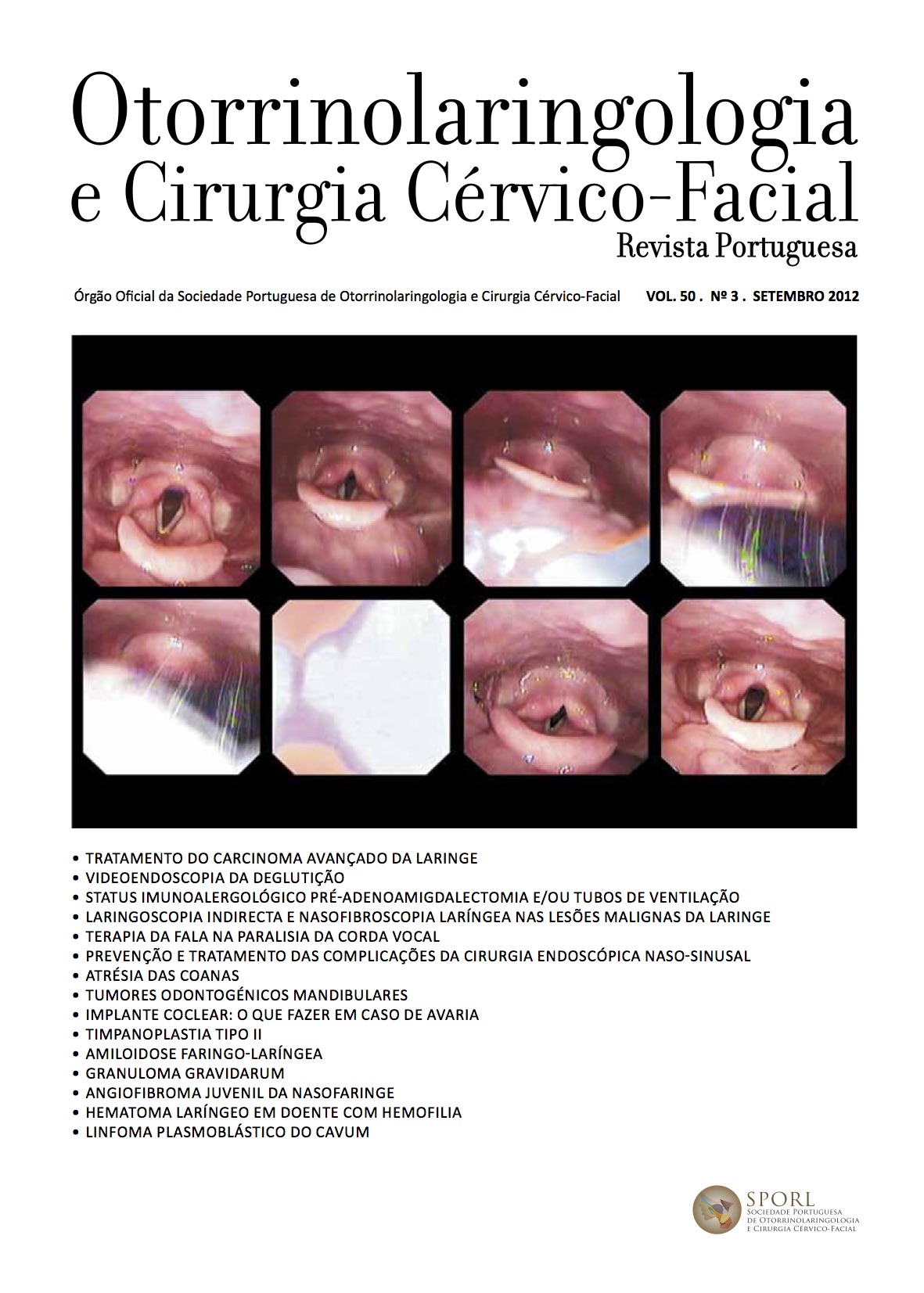Evolução no tratamento do carcinoma avançado da laringe: Estaremos a melhorar?
DOI:
https://doi.org/10.34631/sporl.111Palavras-chave:
Cancro avançado da laringe, tratamento, sobrevida global, sobrevida livre de doença, preservação de orgãoResumo
As opções no tratamento do cancro avançado da laringe têm vindo a ser revistas. Estudos populacionais recentes sugerem uma diminuição da sobrevivência nestes tumores, nas últimas duas décadas. Os autores propõem-se rever a evolução do tratamento dos tumores avançados da laringe no Instituto Português de Oncologia do Porto Francisco Gentil-EPE (IPOPFG-EPE) entre 1996 a 2007. Foram incluídos no estudo 205 doentes em estadio III ou IV estratificados em dois grupos (doentes tratados de 1996 a 1999 e de 2005 a 2007). Entre 1996-99, 50% dos doentes foram submetidos inicialmente a cirurgia, 29% a Radioterapia (RT), 1% a Quimio-Radioterapia (QTRT) e 20% a Quimioterapia (QT) de indução. Entre 2005 e 2007, 72% dos doentes foram tratados inicialmente com cirurgia, 7% com RT, 11% com QTRT e 10% com QT de indução. Não houve diferenças significativas na sobrevida entre os dois períodos. De acordo com a abordagem terapêutica inicial, nos doentes propostos para tratamento cirúrgico a Sobrevida Global (SG) aos 2 anos foi de 61,1% e nos doentes propostos para preservação de órgão foi de 57,1%. Nos doentes propostos inicialmente para QT de indução, a SG aos 2 e 5 anos foi 41,9% e 16%, sendo significativamente inferior à das restantes modalidades terapêuticas. Nesta revisão não verificamos ter havido uma diferença na sobrevivência entre os dois intervalos de tempo estudados. A correcta selecção dos T4 para tratamento cirúrgico inicial provavelmente justificará a manutenção global da sobrevivência.
Downloads
Referências
- Lambert L, Fortin B, Soulières D, Guertin L, et al. Organ preservation with concurrent chemoradiation for advanced laryngeal cancer: are
we succeeding? Int J Radiat Oncol Biol Phys. 2010 Feb 1;76(2):398-402. Epub 2009 Apr 23.
- Wolf GT, Hong WK, Gross Fisher S, Urba Susan, et al. The Induction chemotherapy plus radiation compared with surgery plus radiation
in patients with advanced laryngeal cancer. Department of Veterans Affairs Laryngeal Cancer Study Group.N Engl J Med. 1991 Jun
;324(24):1685-90.
- Forastiere AA, Goepfert H, Maor M, Pajak TF, et al. Concurrent chemotherapy and radiotherapy for organ preservation in advanced
laryngeal cancer. N Engl J Med. 2003 Nov 27;349(22):2091-8.
- Mendenhall WM, Mancuso AA, Hinerman RW, Malyapa RS, et al. Multidisciplinary management of laryngeal carcinoma. Int J Radiat
Oncol Biol Phys. 2007;69(2 Suppl):S12-4. Review.
- Pignon JP, le Maître A, Bourhis J. Meta-Analyses of Chemotherapy in Head and Neck Cancer (MACH-NC): an update. Int J Radiat Oncol
Biol Phys. 2007;69(2 Suppl):S112-4.
- Hoffman HT, Porter K, Karnell LH, Cooper JS, et al. Laryngeal cancer in the United States: changes in demographics, patterns of care, and
survival. Laryngoscope. 2006 Sep;116(9 Pt 2 Suppl 111):1-13.
- Chen AY, Halpern M. Factors predictive of survival in advanced laryngeal cancer. Arch Otolaryngol Head Neck Surg. 2007
Dec;133(12):1270-6.
– Olsen KD. Reexamining the treatment of advanced laryngeal cancer. Head Neck. 2010 Jan;32(1):1-7.
– Wolf GT. Reexamining the treatment of advanced laryngeal cancer: the VA laryngeal cancer study revisited. Head Neck. 2010
Jan;32(1):7-14.
– Gourin CG, Conger BT, Sheils WC, Bilodeau PA, et al. The Effect of Treatment on Survival in Patients with Advanced Laryngeal
Carcinoma. Laryngoscope. 2009 Jul;119(7):1312-7.
– Richard JM, Sancho-Garnier H, Pessey JJ, Luboinski B, et al. Randomized trial of induction chemotherapy in larynx carcinoma.
Oral Oncol. 1998 May;34(3):224-8.
- Worden FP, Moyer J, Lee JS, Wolf GT, et al.Chemoselection as a strategy for organ preservation in patients with T4 laryngeal
squamous cell carcinoma with cartilage invasion. Laryngoscope. 2009 Aug;119(8):1510-7.
- Majem M, Mesia R, Mañós M, Gomez J, et al. Does induction chemotherapy still have a role in larynx preservation strategies? The
experience of Institut Catala d’Oncologia in stage III larynx carcinoma. Laryngoscope. 2006 Sep;116(9):1651-6.
- Posner MR, Norris CM, Wirth LJ, Haddad RI, et al. Sequential therapy for the locally advanced larynx and hypopharynx cancer
subgroup in TAX 324: survival, surgery, and organ preservation. Ann Oncol. 2009 May;20(5):921-7. Epub 2009 Jan 29.
– Major MS, Bumpous JM, Flynn MB, Schill K. Quality of life after treatment for advanced laryngeal and hypopharyngeal cancer.
Laryngoscope. 2001 Aug;111(8):1379-82.
– Hanna E, Sherman A, Cash D, Suen JY, et al.Quality of life for patients following total laryngectomy vs chemoradiation for laryngeal preservation. Arch Otolaryngol Head Neck Surg. 2004 Jul;130(7):875-9.
- Weber RS, Berkey BA, Forastiere A, Ensley J, et al. Outcome of salvage total laryngectomy following organ preservation therapy:
the Radiation Therapy Oncology Group trial 91-11. Arch Otolaryngol Head Neck Surg. 2003 Jan;129(1):44-9.
– Grau C, Johansen LV, Hansen HS, Overgaard J, et al. Salvage laryngectomy and pharyngocutaneous fistulae after primary
radiotherapy for head and neck cancer: a national survey from DAHANCA. Head Neck. 2003 Sep;25(9):711-6.
– Paydarfar JA, Birkmeyer NJ. Complications in head and neck surgery: a meta-analysis of postlaryngectomy pharyngocutaneous
fistula. Arch Otolaryngol Head Neck Surg. 2006 Jan;132(1):67-72.
– DeSanto LW. T3 glottic cancer: options and consequences of the options. Laryngoscope. 1984 Oct;94(10):1311-5.






